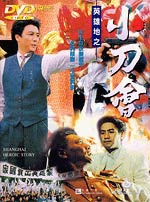
Reviewed by YTSL

“Shanghai Grand”, “Shanghai Blues”, “Shanghai, Shanghai”, etc. According to the HKMDB, there are 23 Hong Kong movies -- plus at least one Taiwanese one whose cast includes Tony Leung Chiu Wai, Carina Lau, Michelle Reis and Rebecca Pan (i.e., Hou Hsiao-Hsien’s “Flowers of Shanghai”) -- with “Shanghai” in their title. This amount obviously pales in comparison to the 83 equivalent works that have “Hong Kong” in their title. What with there being a total of just 11 HKMDB entries -- including “Peking Opera Blues” as well as “Beijing Rocks” -- that have either “Peking” or “Beijing” in their titles (and 11 for “Canton” as well as zero for “Guangdong”) though, the sense that one does get is that the gateway to the mighty Yangtze River occupies a disproportionately large space in the Hong Kong film-making imaginary relative to other Chinese cities (and outside of the “Fragrant Harbor” itself).
One reason for this being so is that quite a few Hong Kongers -- including Wong Kar Wai and his frequent collaborators, William Chang, Maggie Cheung and Rebecca Pan -- have familial roots to that which was the principal geographical setting of SHANGHAI HEROIC STORY (and may actually have been refugees and/or emigrants from there). Another is that the so-called “Paris of China” is considered to be the main Mainland Chinese challenger to Hong Kong for the title of most cosmopolitan Chinese city. In any case, it does seem clear enough that the two international port-cities are perceived by more than one individual to possess stronger socio-cultural affinities with each other than with many other, including geographically closer, parts of China.
Nonetheless, I doubt that either of these large sized metropolises could get mistaken for the other. Put another way: Shanghai does look to contain ample distinctive local “color” to provide those (Hong Kong) movies that are shot there with a certain sought after exotic -- even while still not completely foreign -- flavor. And the “visual originality” that came from shooting this fact and fiction blending film in Shanghai is what seemed to have primarily helped the Chris Lee Kin Sang helmed SHANGHAI HEROIC STORY stand out from the combo crime cum historical drama crowd of movies that seemed to be the rage around the early 1990s for Paul Fonoroff (See his “At the Hong Kong Movies”, 1998:263).
Even while I can see where the not very popular “South China Morning Post” movie critic was coming from, the major distinguishing aspects of SHANGHAI HEROIC STORY for me actually lay in who were accorded significant roles in this offering. For example, this solid 1992 work is the first film that I have seen in which the sometimes almost too respectable looking Damian Lau plays a bad guy (In fact, his dastardly Boss Ngai Ting Yim character -- who came by much of his substantial fortune by way of the opium trade and other unsavory dealings, including collaborating with the Japanese at a time when that national group had earned the ire of many Chinese folks by going and occupying Tsingtao along with other parts of Shandong province -- is the chief villain of the piece as well as someone that more than one individual would have ample plus understandable reasons to want dead).
Alternatively, while Roy Cheung’s Wong Tai Kwong, AKA Brother Kwong, character held the position of lieutenant to Boss Ngai for part of the early 20th century period piece, he arguably still was a largely honorable figure (plus one who is more admirable plus sympathetic than even some of those individuals he has portrayed who -- like with the prison officer in “Prison on Fire” -- are technically on the right side of the law). Indeed, so positive plus strong was the light that was often cast on this man -- whose true love was a woman he had wanted to be with (named Pearl and played by Yu Li) even when the both of them were penniless, rather than power or money per se -- that there were times when I got to wondering whether it would have been more accurate to bestow this at least double-stranded Nam Yin, Victor Hon Kwan and Chan Ting co-scripted work with a title that spoke of its containing more than one SHANGHAI HEROIC STORY.
At the same time, there is little doubt that at least one heroic figure in SHANGHAI HEROIC STORY is the leading member of the patriotic Chinese Dagger Association known as Lok Chi Hing (and portrayed by Vincent Wan). In view of my thinking that he -- who may be best known to many Hong Kong filmophiles for playing Ben Hon in “Portland Street Blues” and some others of the “Young and Dangerous” efforts -- is criminally under-utilized as a main man by HKSAR movie makers, it came as a real pleasure for me to see this actor appearing to make the most of his prominent plus (physically) active part in this movie. Some other casting choices that helped me to be entertained by this eventful effort -- that definitely had its moments but, somehow, never was as consistently compelling as it should have been -- involved four pretty varied as well as interesting supporting roles in the work getting accorded to females (whose parts thereby included that of the right hand ‘man’ of Lok Chi Hing (named Ching Siu Pui and essayed by Pan Ka-Lai), a Japanese villainess who kills more often than she talks, a tomboyish pickpocket (played by Nadia Chan), and Yu Li’s outwardly glamorous songstress).
My rating for the film: 7.